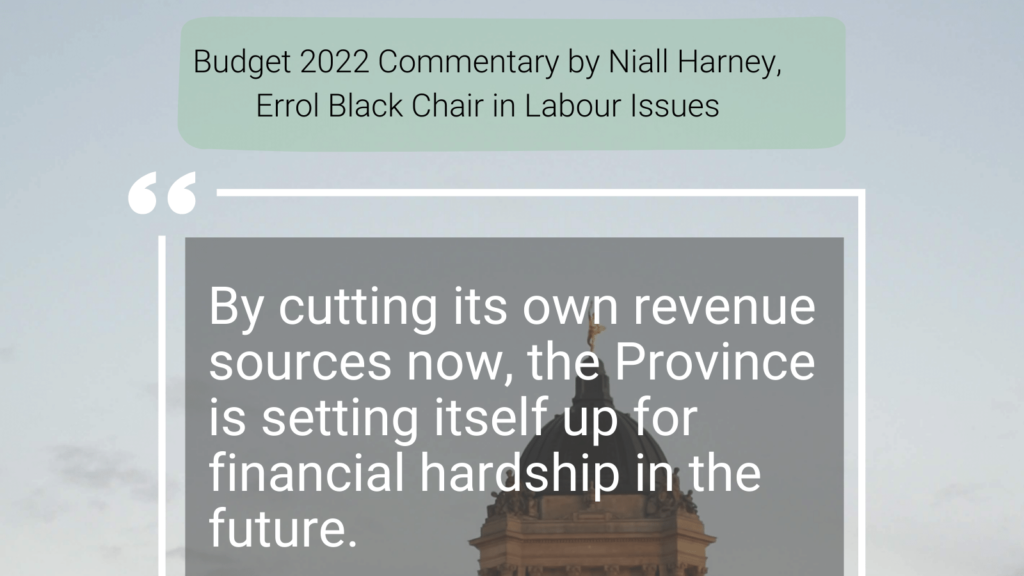Previously published in the Winnipeg Free Press May 4, 2002

By Niall Harney
Premier Stefanson’s first budget misses a huge opportunity to repair Manitoba’s struggling public service. Rather than investing in a robust economic recovery, this budget continues to hold out on public sector workers who deliver critical services. Prioritizing tax cuts over public spending will increase the gap between the province’s rich and poor, and exposes the Province’s public finances to the worst effects of the economic downturn.
Budget 2022 offers virtually no funding to hire healthcare workers and teachers, or to settle with the over 60,000 public sector employees working without contracts. The same is true for personal care home staff and home care workers, whose wages have been frozen for six years. Instead, the government has doubled down on their hostile approach to the public sector, which is causing skilled workers to leave their professions and seek jobs elsewhere.
In healthcare, the Budget announced $11 million to increase nursing spaces at universities and $100 million to expand the St. Boniface ER. These investments are welcome, but only begin to increase capacity years down the road. A 2.4% increase in operating funding, below the rate of inflation, will not address ER overcrowding or nurse shortages which are placing huge pressure on healthcare workers today, or address recruitment and retention. The Provincial government spent $40 million last year on private nursing agencies to cover chronic staffing shortages created by its own underfunding of the public system. Personal care homes will receive a 2.9% increase while home care will receive 1.9%, both below inflation, effectively cutting care to seniors.
The situation with education is similar. Promises were made in the budget to provide capital funding for school construction, but operating funding for schools is increasing by 2.8%, a cut after adjusting for inflation. Manitoba’s public universities and colleges will see their grant funding increase by just 0.2%, a significant cut in inflation-adjusted dollars.
While continuing to hold out on public sector workers, the government is using deficits to fund large tax cuts. Cuts to the education property tax will reduce government revenue by $350 million in 2022 and $450 million in 2023. Adding up tax cuts since 2019, the Province has reduced its revenue by $1.2 billion per year. Budget 2022 projects a $548 million deficit: the government is borrowing money for tax cuts at a direct expense to starved public services.
Cutting taxes at the beginning of this economic recovery squanders a huge opportunity to invest in public services. Despite tax cuts, Government revenue is set to increase by $1.5 billion this year thanks to federal government transfers and tax revenue growth on the back of a booming economy. Flush with cash, the government could easily invest in increasing staff capacity in the public sector, which will in turn boost wages and deliver public benefits. Instead, cuts to the education property tax will increase the gap between wealthy property owners and everyone else while delivering minimal public benefit.
Funding for housing and climate are two more missed opportunities. The Right to Housing Coalition and Make Poverty History Manitoba called on the province to spend $60 million annually starting in 2022 to create 300 social housing units per year. The province responded with only $10 million in grants while cutting funding for Manitoba housing maintenance. Despite the need to radically cut GHG emissions by 2030, the province is offering a minuscule $1.5 million for clean energy infrastructure.
The Government’s fiscal strategy seems to imagine we are out of the pandemic woods. Manitoba’s economy is growing quickly now, but this growth may not persist over the coming months and years. Interest-rate hikes at the Bank of Canada and the US Federal Reserve will likely slow the economic recovery over time. The Bank of Canada is already forecasting slower growth for 2023 and 2024. By cutting its own revenue sources now, Manitoba is setting itself up for financial hardship in the future.
The Province justifies its tax cuts by pointing to the rising cost of living. While this will offer some short-term relief, it is not a long-term solution. In the long term, the government should provide alternative goods and services at low prices and focus on boosting wages across sectors. Moving more quickly on $10 per day childcare, for example, will provide much more financial relief for families than the property tax cut. If the province wants to boost incomes, it should look no further than the thousands of public employees struggling with frozen wages.
Niall Harney holds the Errol Black Chair in Labour Issues at the Canadian Centre for Policy Alternatives – Manitoba.


